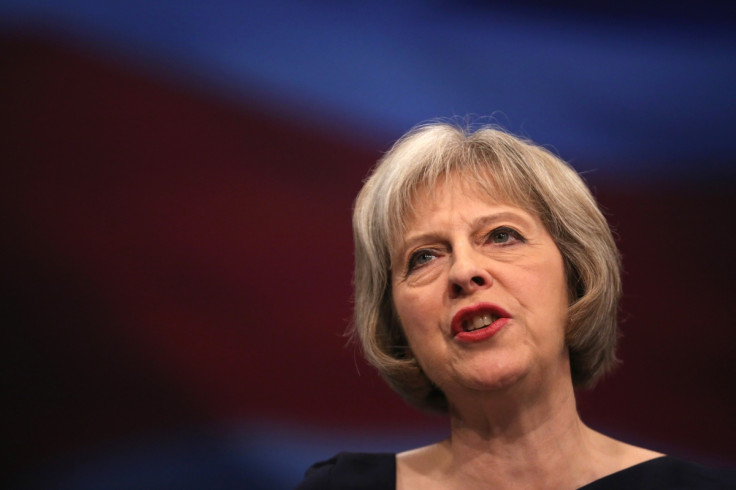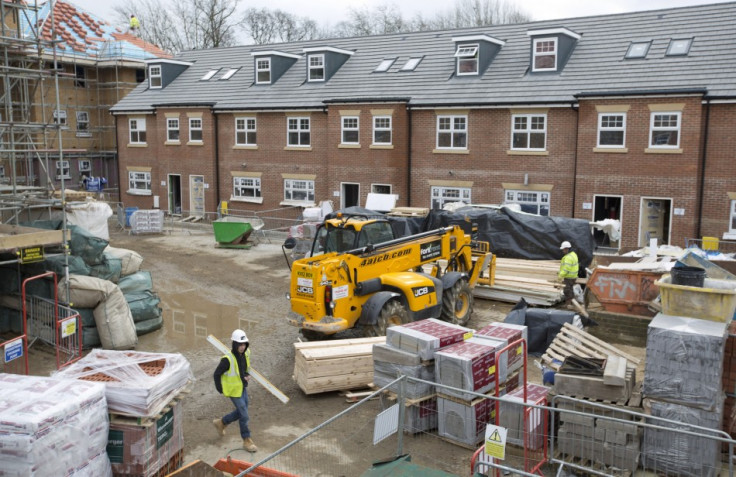Theresa May speech: Immigration may 'put a strain' on UK infrastructure but it helps build it too

Immigrants are putting intense pressure on the UK's already creaking infrastructure, said the home secretary Theresa May in a controversial speech to her party's Manchester conference in what critics liken more to a foghorn than dog-whistle on the fiery issue of migration.
There is a thundering contradiction at the heart of May's critique of immigration to Britain. The country's infrastructure desperately needs it − from housing to rail to health, all rely on migrant workers to build and staff vital infrastructure − and yet all of it is put at risk by the immigration hawks May is signalling to.
"Because when immigration is too high, when the pace of change is too fast, it's impossible to build a cohesive society," said May, who is eyeing the post-David Cameron Tory leadership election and knows immigration is the highest priority on the voter agenda. "It's difficult for schools and hospitals and core infrastructure, like housing and transport, to cope."
Services would struggle to cope
Polling by Ipsos MORI shows just how at the fore immigration is in people's minds. In its Issues Index for September, immigration came out on top, with 56% of the British public naming it the single most important issue − the highest rating it has ever had and way ahead of the NHS in second place at 36%.
Net migration to the UK has shot up in recent years, mostly because of immigration from the EU, where the 500 million citizens of its 28 member states − including poorer post-communist societies − can move freely. According to the Office for National Statistics (ONS), net migration − the amount of people coming in minus those leaving − was 330,000 in the year to March 2015, up 28%.
Many voters are concerned that immigration brings social as well as economic challenges. That migrants drive down wages and force British citizens out of jobs, though some of the academic research disputes both of these assertions. Broadly speaking, EU migrants pay more into the system than they take out of it. This is the counter argument to what is known as the Lump of Labour Fallacy − that the jobs market is zero sum, so migrants displace others from work − because EU immigration boosts the economy, creates more jobs and increases revenue for the public purse. Revenue that helps pay for infrastructure investment.

"While it may be the case that lower immigration would take some pressure off services (and even that is not clear), reducing immigration could have serious negative effects too," said Dr Catherine Harris, research fellow in EU migration and ethnic entrepreneurship at the University of Sheffield. "Migrants put a lot back into the UK economy through taxes, and many work in important jobs in the very services that May claims find it difficult to cope."
And, importantly for business, immigration is a quick, easy and efficient way for them to fill skills gaps − particularly when those migrants travel unhindered from the EU − when they cannot find the workers they need already in the labour market. Business groups were quick to condemn May's speech. Simon Walker, director general of the Institute of Directors (IoD), said he was "astonished by the irresponsible rhetoric and pandering to anti-immigration sentiment".
"It is yet another example of the home secretary turning away the world's best and brightest, putting internal party politics ahead of the country, and helping our competitor economies instead of our own," Walker said.
"The myth of the job-stealing-immigrant is nonsense. Immigrants do not steal jobs, they help fill vital skill shortages and, in doing so, create demand and more jobs. If they did steal jobs, we wouldn't have the record levels of employment we currently do.
"It is about time the Home Office stopped undermining business and our own government's efforts to secure productivity growth. Political leaders should stop vilifying migrants and acknowledge the hugely important contribution they make to this country's economy."
Opportunities for construction
Take the construction sector as an example. There is a serious skills shortage that has seen reports of bricklayers in London being able to demand a day rate the equivalent of a £100,000 a year salary. This skills shortage imperils attempts to deal with the severe housing shortage, particularly in London and the south east of England, because it delays construction work and makes building more expensive. Part of the solution lies in training a new generation of young British construction workers who are unemployed or fresh out of school, and this must not be skimmed over in the blind chasing of migrant labour. But as the Chartered Institute of Building put it in a 2015 report, "construction and migration have been intimately linked for millennia".
"Immigration offers threats that must be met," the report said. "But it offers, for the construction industry and, as a result to the nation, many more opportunities."
Immigration offers threats that must be met. But it offers, for the construction industry and, as a result to the nation, many more opportunities.
Quitting the EU would put an expensive new bureaucratic wall between British construction firms and the European migrant labour on which they partly rely and could not easily or quickly, if at all fully, be replaced with domestic construction workers. And that means fewer homes being built. We are already building at half the rate we need.
More than just the construction sector, there are other areas of British infrastructure that depend on immigration. The NHS, the second most important issue to British voters according to Ipsos MORI polling, would not cope unless it had a stream of immigrants to work as doctors, nurses and surgeons, right down to cleaners. Now more than ever the NHS is powered by migrant labour. In fact, it needs more migrant labour to fill shortages.
Back in May 2015, Peter Carter, general secretary of the Royal College of Nursing, said stricter immigration rules would hurt the NHS. "The immigration rules will cause chaos for the NHS and other care services," Carter told BBC News. "At a time when demand is increasing, the UK is perversely making it harder to employ staff from overseas."
In transport, migrants help repair the tracks, drive the buses, man the ticket offices, clean the stations, and more. In the schools, colleges and universities their taxes help pay for, they teach the next generation. Any shortage of places is a political failure of Westminster − and there have been many years, many failures − not the fault of the migrant.
Britain's infrastructure will undoubtedly be put under additional pressure from immigration because it increases the size of the population it must serve. But much of that infrastructure could not function − and possibly would not even exist − were it not for the migrants who come here. Their labour helps to build, staff and fund it, to the benefit of everyone in the UK.
© Copyright IBTimes 2025. All rights reserved.






















